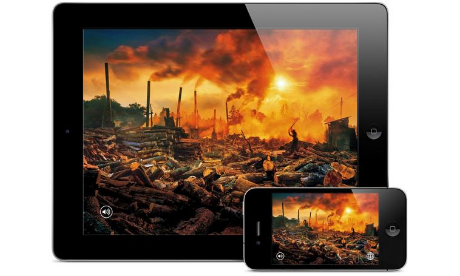
Former US vice-president Al Gore has used various media to make his climate change arguments in recent years, starting with a live presentation, which evolved into a book and then Oscar-winning film, An Inconvenient Truth. His latest platform is Apple's iOS, with book-app Our Choice.
It was developed by San Francisco startup Push Pop Press, working with book publisher Rodale, production company Melcher Media and Gore himself. "We think that the app is probably one of the richest, most interactive forms of storytelling that exist," Push Pop Press co-founder Kimon Tsinteris tells Apps Blog. "One of our founding premises is to re-imagine the book."
Tsinteris and co-founder Mike Matas used to work at Apple – Tsinteris as a binary mixologist working most recently on maps and location-based services for the iPhone, and Matas as a human interface designer.
The Our Choice app was released in late April 2011 as a paid app, costing £2.99 and running across all iOS devices. "We weren't really sure how it was going to be received," says Tsinteris. "There are a lot of naysayers around digital publishing, but people have been very appreciative of the level of detail that has gone into it."
That includes more than 250 images, an hour of documentary footage and more than 30 infographics and animations, along with text from the original Our Choice book and an audio commentary from Gore. However, Push Pop Press wasn't set up to create just one app.
"It really is a platform," says Tsinteris. "When we started this project, the app was going to be just for iPhone, but when the iPad came out, Mr Gore also wanted a version for that. We sat down and built the tools needed to create a book once for both devices. We have an editor, a publishing/hosting solution and a document format. The app is really just a viewer of content."
At some point, Push Pop Press may open up this platform for more book publishers to work with, bringing their existing print titles to the apps world. However, Tsinteris says, for now the developer is more interested in working on a project-by-project basis with authors and publishers who want to properly take advantage of the new multimedia tools, as opposed to simply slapping some videos on top of a printed text.
In that sense, Push Pop Press can be compared with other book-app developers working on their own platforms, such as New Zealand startup Trade Mobile, which worked with historian David Starkey on the recent Kings and Queens iPad app, or Touch Press, which is behind the critically acclaimed The Elements, Solar System for iPad and Gems and Jewels applications.
It's notable that all these developers are focusing on iOS first. That might not be a surprise in Push Pop Press's case given its co-founders' backgrounds, but Tsinteris says his company's choice is purely pragmatic.
"Right now, iOS has the lead in terms of being the most mature platform for both smartphone and tablet," he says. "Other people will make progress though: you'll see some of the technologies in iOS come back to the Mac, then there's PC, clearly Android, BlackBerry PlayBook … We're happy to go where the market is, but right now, the successful store – the one where people are willing to purchase content – is the App Store. You can publish with a price tag."
For now, many of these book-apps are relatively solitary experiences: someone produces the content, and people read/watch/use it. Is there a role for more social features in these kind of publishing platforms going forward though?
"There is definitely potential, but the thing we really focused on is the relationship between the viewer and the content," says Tsinteris. "After that, social is a great way to let those viewers share the content with their friends. We see social as the next step on top of a great interactive consumer experience. Also, doing social right is tricky, and we don't really want to interrupt that experience."
That said, social brings Tsinteris back to where he started: the power of apps as a medium for storytelling.
"There's a primordial instinct: people gather round the fire and tell stories," says Tsinteris. "It used to be travelling bards, now it's people tweeting or uploading Facebook pictures. Everybody is a storyteller at heart."

